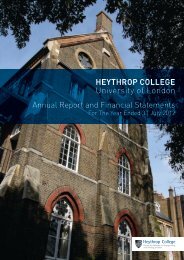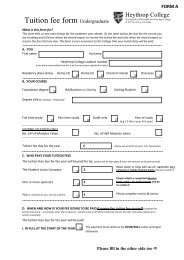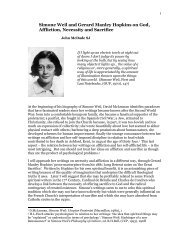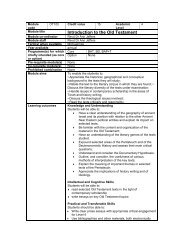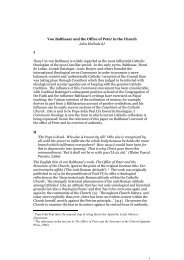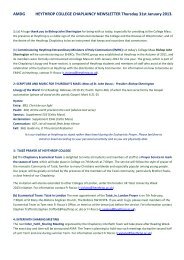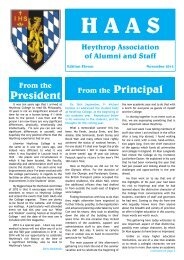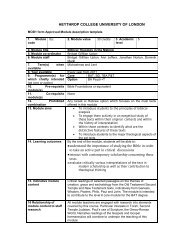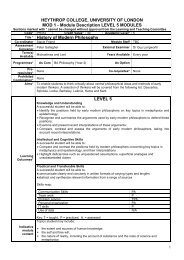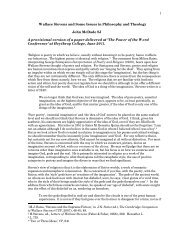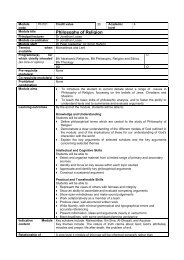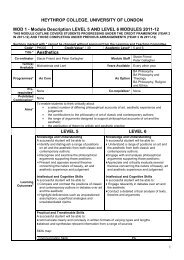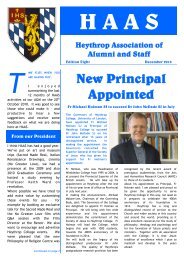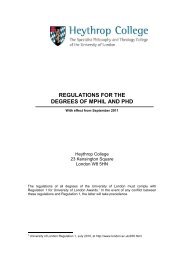Academic Regulations for first degrees and ... - Heythrop College
Academic Regulations for first degrees and ... - Heythrop College
Academic Regulations for first degrees and ... - Heythrop College
You also want an ePaper? Increase the reach of your titles
YUMPU automatically turns print PDFs into web optimized ePapers that Google loves.
20.4 Discretion may be exercised in order to raise a borderline degree result by<br />
a class when the deciding mark falls short of the higher classification by<br />
no more than two marks. However, the higher degree classification should<br />
not be awarded automatically in these cases. If it were, the effect would be<br />
to alter the original classification criteria. At the Pre-Board, a meeting of<br />
the Chair of the Board of Examiners with the Assessment Convenors,<br />
<strong>Academic</strong> Registrar or nominee, <strong>and</strong> Dean of Undergraduate Studies,<br />
those present must agree that there is a case <strong>for</strong> discretion, having<br />
reviewed the particular deciding mark(s) which put this result on a<br />
borderline, <strong>and</strong> judging that these marks should not necessarily hold the<br />
degree result in the lower class. Then, in addition, one or more of the<br />
following must apply:<br />
The undergraduate dissertation mark is normally in the higher Class,<br />
although the ninth (deciding) mark down from the highest mark is in the<br />
lower class b<strong>and</strong>.<br />
There has been significant improvement in the profile of marks over the<br />
period of time that the degree has been assessed, especially at level 6 (or<br />
5 <strong>for</strong> the Foundation degree) (sometimes called ‘exit velocity’).<br />
21. <strong>Academic</strong> Conduct<br />
21.1. Students are required to comply with the regulations <strong>for</strong> the conduct of<br />
examinations, <strong>and</strong> with published guidelines in relation to academic<br />
conduct, including plagiarism <strong>and</strong> other assessment offences.<br />
21.2. Assessment misconduct is conduct in relation to an examination or other<br />
assessment task which breaches the regulations <strong>and</strong> guidelines in such a<br />
way as to give a c<strong>and</strong>idate unfair advantage. The <strong>College</strong> may initiate an<br />
investigation if suspected misconduct is reported by an invigilator, marker,<br />
moderator, external or intercollegiate examiner or other relevant party.<br />
Anonymous allegations will not be investigated. Misconduct to be<br />
investigated may be in the <strong>for</strong>m of, but is not restricted to:<br />
• Possessing or using unauthorised aids in an examination;<br />
• Plagiarism;<br />
• Assisting another student to gain unfair advantage in assessment;<br />
• Fabricating or falsifying in<strong>for</strong>mation in work presented <strong>for</strong> assessment<br />
21.3. The procedures used to investigate assessment offences are detailed in<br />
Appendix H, which also summarises the penalties which may be applied.<br />
The general principle is that the penalty should be appropriate to the scale<br />
of the offence <strong>and</strong> to the stage reached in the student’s studies.<br />
21.4. A c<strong>and</strong>idate shall have the right to appeal against a decision made<br />
following investigation, on the grounds of new evidence which he or she<br />
was previously unable to provide. A c<strong>and</strong>idate may appeal against the<br />
penalty imposed on the grounds that it is unreasonably harsh.<br />
22. Pass Lists <strong>and</strong> Notification of Results<br />
22.1. Except <strong>for</strong> the provisions of 22.4 below, all students following <strong>College</strong><br />
regulated undergraduate <strong>and</strong> taught postgraduate programmes will be<br />
18



